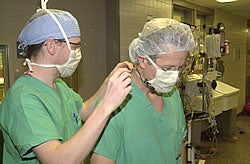Gastric bypass surgery subject of Webcast
Surgeons from East Carolina University performed a gastric-bypass operation live on the Internet Tuesday at Pitt County Memorial Hospital.
Dr. Kenneth G. MacDonald moderated the surgery for viewers as Dr. William H. Chapman III operated. Both are faculty members in the Department of Surgery at the Brody School of Medicine at East Carolina University. Viewers can watch a replay of the surgery online at University Health Systems of Eastern Carolina’s Web site, www.uhseast.com.

Tomas Mac Seain, left, an audio engineer with Internet broadcaster slp3D, wires a microphone on Dr. William Chapman in preparation for a gastric-bypass surgery Webcast. Photo by Cliff Hollis
Gastric-bypass surgery is a non-reversible treatment option for morbidly obese patients. People who weigh at least 100 pounds more than ideal body weight, have a body mass index of 35 and suffer from associated health problems — such as hypertension, diabetes, sleep apnea and joint pain — are ideal candidates. Patients who have a body mass index of 40 with no associated health conditions also are considered to be candidates for the procedure.
During the procedure, surgeons create a small stomach pouch with a capacity of less than 1 ounce. They then attach a portion of the small intestine to the pouch, leaving a small hole through which food can pass. After surgery, patients will feel full after eating only a small amount of food and will stay full longer after a meal. Because the small hole between the pouch and small intestine prohibits food from exiting the stomach too quickly, patients feel less hungry between meals.
MacDonald is chief of gastrointestinal surgery and surgical endoscopy at the Brody School of Medicine at ECU. He also serves as governor of the American College of Surgeons. He is a past president of the American Society of Bariatric Surgeons and serves on the ethics and bylaws committees and the executive council of the ASBS. MacDonald also is a member of the International Federation for the Surgery of Obesity. He has presented his research at more than 130 conferences nationally and internationally.
Chapman directs the Minimally Invasive and Robotic Surgery Center and assistant director of the Bariatric Surgery Fellowship Program at ECU. He was the first surgeon to perform a robotic adrenalectomy, which is the removal of one or both adrenal glands. He was one of the first to remove a spleen robotically. Additionally, he helped establish the minimally invasive surgery program at PCMH and helped redesign PCMH operating rooms to accommodate minimally invasive surgery. Chapman also is on the editorial board of Current Surgery.
The bariatric surgery program at PCMH and the Brody School of Medicine began in 1978 with the pioneering work of Dr. Walter Pories, ECU faculty member and former chairman of the Department of Surgery. Together with Dr. Adrianus Van Rij, Pories standardized the dimensions of a new surgery — the gastric bypass — to produce the Greenville Gastric Bypass. The ECU program attracts patients from North Carolina, other states and abroad.
Internet broadcaster slp3D, which creates live and on-demand video for the health care industry, produced and transmitted the surgery over the World Wide Web.